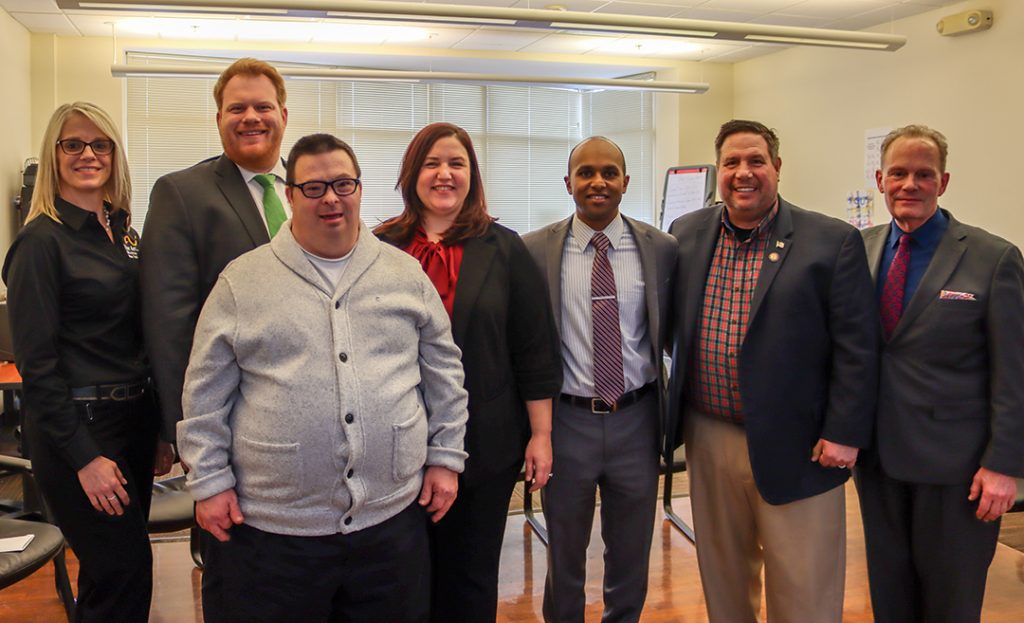CDS Monarch, Arc of Monroe, and State Legislators Join to Advocate for Direct Support Professional Wage Increase
They are advocating for 8.5 percent, up from 2.5 percent in Gov. Hochul’s FY 2024 Executive Budget, and a permanent wage enhancement for not-for-profit providers
WEBSTER, NY – Direct Support Professionals working for not-for-profit providers and individuals with intellectual and developmental disabilities joined with state legislators today to advocate together for the inclusion of an 8.5 percent COLA for direct service professionals and the establishment of a new Direct Support Wage Enhancement in the FY 2024 New York State budget.
“Our Direct Support Professionals (DSPs) are highly skilled, vital frontline employees who are dedicated to taking on critical responsibilities to ensure the safety, productivity, and well-being of individuals with intellectual and developmental disabilities (I/DD). Yet, in the eyes of those in the state who make budgetary decisions, the fundamental supports our direct care staff provide do not warrant continued investment at even the level that would simply maintain the status quo in service delivery. And that is detrimental – not only to the ability to recruit and retain qualified staff – but to the individuals who depend on them every day,” said Andrew Sewnauth, CDS Life Transitions CEO. (CDS Monarch is an affiliate of CDS Life Transitions)
Currently included in the NYS draft budget is a 2.5 percent COLA, which is estimated at roughly
$74.8 million. Advocates have called for an 8.5 percent COLA, roughly $254.3 million, to raise direct support wages to competitive levels. Additionally, organizations like CDS Monarch are calling on New York State to implement a permanent Direct Support Wage Enhancement (DSWE) that would be built into future budgets moving forward.

“We are recommending that state legislators implement a permanent DSWE investment to allow providers to offer $4,000 per eligible employee to enhance the hourly rate of pay for all staff performing direct care/support for people with I/DD. This wage enhancement would be similar to the one offered to DSPs/staff in state-operated settings,” said Sewnauth.
The Arc of Monroe President and CEO Tracy Petrichick said, “Quality of life is important to all human beings, and it’s no different for someone with a disability. I’m advocating to increase the 2.5 percent COLA to 8.5 percent, to offset rising inflationary costs because it’s the right and moral thing to do. The state has to find a way to pay DSPs what they are worth, so compassionate and talented people stay in the field and our most vulnerable receive the kind of care that enhances and enriches their lives. Because nonprofits are reimbursed with state money, that funding limits how much we can pay our DSPs. We’re grateful to our legislators who understand this and are advocating for us, and we desperately need to see that translate into substantial, ongoing investment in our field.”
State Senator Samara Brouk said, “As Chair of the Senate Committee on Mental Health, I have seen firsthand the results of having an underpaid and overlooked workforce, and how that can negatively impact our most vulnerable New Yorkers. Direct Service Professionals play an essential role in making sure that all people receive necessary care and support and are treated with the dignity and respect they deserve. This is challenging, and at times emotional work, and stagnant wages can make it near-impossible to retain quality staff. The Enacted Budget must include an 8.5 percent COLA for these workers, as well as provisions from my legislation (S.1291) to automate future adjustments based on the rate of inflation.”
State Assemblymember Jennifer Lunsford said, “The state relies on not-for-profit voluntary service providers like CDS Monarch and Arc of Monroe to provide critical services to our residents with intellectual and developmental disabilities (I/DD). The direct service professionals (DSPs) who work at these incredible agencies are essential to providing safe, quality care to our most vulnerable residents. For far too long, these hardworking individuals have been paid less than their public sector counterparts, despite performing the same physically and emotionally demanding work. With rising wages in less challenging positions like fast-food and retail, it is becoming increasingly difficult to keep caring individuals in these jobs where they are desperately needed. Further, many of the workers in these positions are women and people of color struggling to make ends meet for themselves. As we continue to recover from the pandemic and navigate this period of inflation, it is imperative that DSPs and the I/DD community do not get further left behind. This year’s budget must include the 8.5 percent cost of living increase and wage enhancements for all DSPs, in both the public and voluntary service sectors. An increase in pay for these workers will not only help address the workforce shortage keeping beds closed and individuals with disabilities on waitlists for housing, but it will also help lift families out of poverty and provide stable careers for families fighting their way into the middle class.”
State Assemblymember Brian Manktelow said, “Everyday Direct Service Providers go to work with a heart full of passion for serving the most vulnerable members of society. For too long these employees have battled for a decent wage, and time after time the State has left them feeling abandoned. Together we stand here yet again in support of DSPs and push for a cost-of-living adjustment of 8.5 percent. They are one of the few groups of people whose earnings are set by the state, and it is high time we acted to help them. We urge State leadership to provide this sensible COLA and push for further investment into those who care for our loved ones.”
State Assemblymember Josh Jensen said, “I am proud to join with CDS Life Transitions, and my colleagues in state government, to unite our voices in calling for a cost-of-living increase for direct support professionals, as well as the Direct Service Wage Enhancement. The amount of work and intense level of care that DSPs provide to those they are entrusted to care for is critically important, and they deserve adequate compensation to match their efforts. Without their services, access to appropriate care and opportunities for individuals with developmental disabilities would be inadequate. While inclusion of this funding in the enacted budget is crucial, we must work to set up a system where providers and professionals are not forced to come to the state every year for additional funding, rather find a way to ensure that their support increases as the cost of providing this care increases.”




